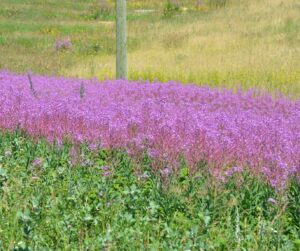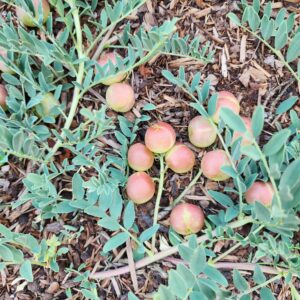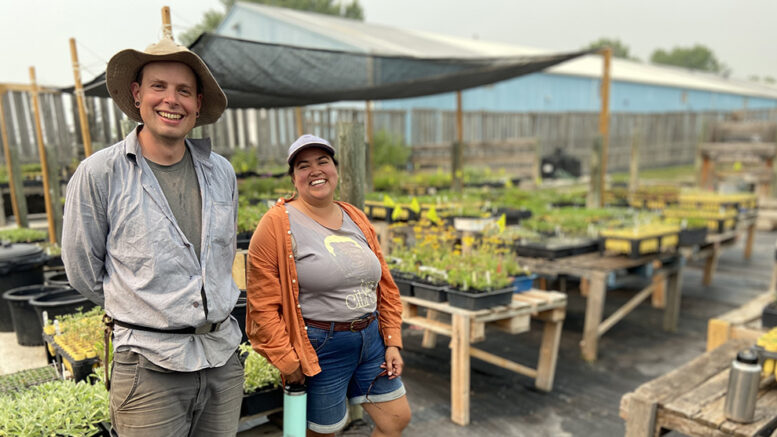By Laura Mushumanski
(ANNews) – Traditional Indigenous plant medicines are plants that grow locally, also known as native plants. They grow in specific regions without the involvement of human interference. In other words these plants thrive based on their ecosystem that aids them to flourish under the right growing conditions. Native plants can be perennials, annuals, and biennials in their native habitat depending on the plant species. They are low maintenance and are taken care of by all the elements in nature. In each region around the world, native plants exist and come in different varieties of plants, where no two are alike. All our ancestors lived among plants that were native to their homelands, bringing them nourishment in abundance for people to thrive as food, shelter, oxygen, tools, and various creative ways that aided people in good health and well-being.

Fireweed (Chamaenerion angustifolium) growing wild in a municipal park.
Another important key component with native plants is how they support our ecosystem, especially our pollinator friends that in turn help plants nourish everyone and everything that resides on Mother Earth. One company in Southern Alberta that is helping these native plants thrive is ALCLA Native Plants by engaging in “ways of seeing how we interact with nature,” said Latifa Pelletier-Ahmed, a team member, botanist and herbalist, for the sole purpose of increasing the biodiversity in native plants that are on the decline.
Both Pelletier-Ahmed and her partner at ALCLA Ben Hartney, who holds a Red Seal Certificate in Landscape Horticulture, have been lovers of plants all their lives. So, when the opportunity to purchase ALCLA in 2019 came up, the two made a heartfelt decision to further their “relationship with plants in a meaningful way,” said Hartney.
Through ALCLA’s commitment to building sustainable plant relationships in an ethical way, ALCLA also offers educational programs. Topics include: how plants grow, plant relationships with animals and humans, plant identification, horticulture-related subjects, and anything related to how native plants play a role within our ecosystem.
“One native plant makes life thrive, and you can help those tiny beings by being a refuge for them. The life of these native plants can be in abundance, and we all have a responsibility to take part in it,” shared Pelletier-Ahmed on how if everyone grew native plants in their own neighborhoods or helped support native plants to thrive in a meaningful way, we could all be a part of something bigger that supports the longevity of our ecosystems.
ALCLA also offers native plants and seeds for purchase on their website. In their plant nursery they specialize in Alberta native plant production and genetics in the Treaty 7 region, including grasses, wildflowers, and shrubs plugs and seeds. Seeds from these native plants germinate according to their life cycle while considering temperature, genetics, and environmental guidance.

Ground Plum (Astragalus crassicarpus) growing in the home garden.
With the level of habitat loss increasing, ALCLA encourages teachings that were passed on to them from Blackfoot knowledge keepers on how to sustain the life of these traditional plants. Protocol is the fundamental teacher of slowing down to engage in a reciprocal relationship built on learning without taking. Start with honouring the plant; some Indigenous cultural practices include putting tobacco down as a form of good relationships and respect. Tobacco that is used in ceremony is a traditional Indigenous medicine but not native to Canada because it does not have a long and hot enough growing season, and although the plant is used widely in exchange of reciprocal relationships, it is also important to understand the practice of being mindful when engaging in relationships, especially within the plant world.
“Never pick the first plant you see and only pick what you need. You don’t know who else has been there to harvest,” said Latifa, because that might be the only plant there is, and although these plants may seem to thrive in abundance, that is not always the case. With larger populations and plant medicines becoming more popular, part of the work that ALCLA does directly relates to how we can sustain the native plants within our ecosystems so there will be enough for future generations to learn from and live among.
ALCLA collaborates with numerous organizations including the Alberta Native Bee Council, Alberta Native Plant Council, Bee City Canada, Buffalo Rock Tipi Camp, Canadian Coalition for Invasive Plant Regulation, Edmonton Native Plant Society, and Grassland Restoration Forum by working together to conserve native plant species.
Laura Mushumanski is a Local Journalism Initiative Reporter.



I love that Alberta has so many conservationist societies trying to make our environment a better place to live in 💕